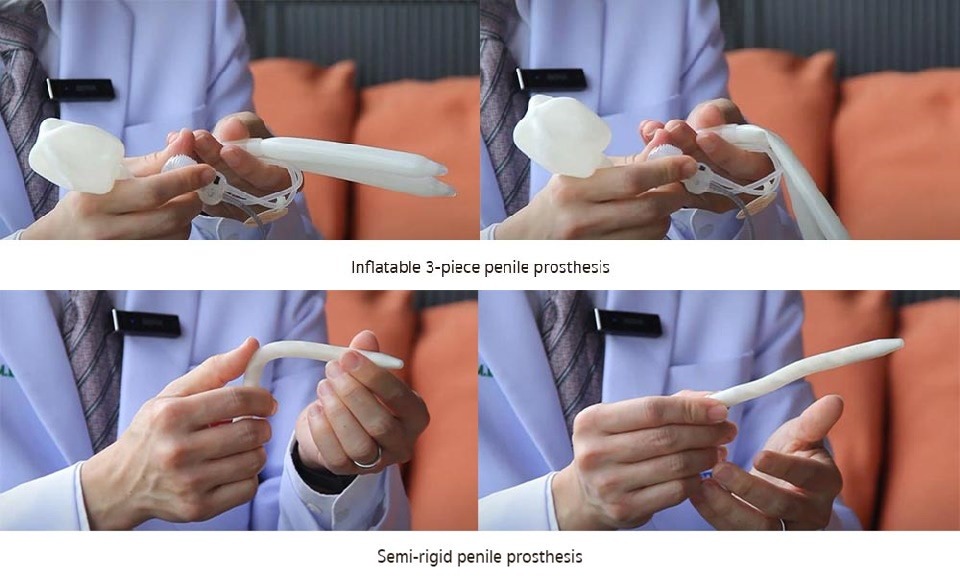
When a man experiences Erectile Dysfunction (ED), he may feel a range of physical and emotional effects. There are common physical feelings associated with ED such as inability to achieve an erection or reduced sexual desire. A part of physical, a man could have emotional and psychological feelings due to low self-esteem. When joining a group of men’s activities, they can feel frustration or embarrassment when talking about men’s health. These can lead a man to anxiety and depression.
There are various non-surgical treatments which urologists will recommend to you after investigations such as oral medications, injection therapy, urethral suppositories, hormone therapy, vacuum constriction device and shockwave therapy.
In my 10 years of experience with patients who have ED problems, the Penile prosthesis is a valuable option for those who have not had success with non-surgical treatments, it is the surgical insertion of inflatable or semi-rigid devices into the penis offering a long-term solution to achieve and maintain an erection.
There are two main types of penile prosthesis, inflatable and semi-rigid, each type works differently and has various pros and cons. It is important that you must fully understand this procedure before making a decision undergoing penile prosthesis surgery including risk possibilities, complications and after care or follow-up care.
 As you may be aware of penile prosthesis surgery that isn’t for every individual patient. Therefore, urologist might caution against penile prosthesis if you have:
As you may be aware of penile prosthesis surgery that isn’t for every individual patient. Therefore, urologist might caution against penile prosthesis if you have:
- An infection, such as a pulmonary infection or urinary tract infection.
- Diabetes that isn’t well controlled or significant heart disease.
While penile prosthesis allows men to achieve an erection, they don’t increase sexual desire or sensation. Penile prosthesis also won’t make your penis any larger than it is at the time of surgery. In fact, with prosthesis, your erect penis might seem slightly shorter than it used to be.
Self-preparation for surgery:
- Pre-operative consultation:Discuss with urologist about your medical history, the types of implants available, and which might be the best option for you. Ensure all your questions are answered.
- Medical evaluation: You may need to undergo several tests such as blood tests, urine tests, and an electrocardiogram (EKG) to ensure you are fit for surgery.
- Medications: Inform urologists about any medications or supplements you are taking. You may need to stop taking certain medications such as blood thinners at least 7 days before surgery.
- Fasting: You will be advised not to eat or drink anything after midnight on the night before the surgery.
- Hygiene: Follow any specific instructions given by your surgeon regarding showering or cleansing the surgical area before the procedure.
- Post-operative care planning: Arrange for someone to drive you home after the surgery and assist you for the first few days as you recover. Prepare your home to ensure a comfortable and easy recovery.
By thoroughly understanding the procedure, preparing adequately, and following your surgeon’s instructions, you can increase the likelihood of a successful outcome and smooth recovery from penile prosthesis surgery. Although penile implants are the most invasive treatment for erectile dysfunction, most men who have them and their partners report satisfaction with the devices. In fact, penile prosthesis has the highest rate of satisfaction of all erectile dysfunction treatments.
If you have any further questions or need additional information, consult with me by clinking at the button below for booking an appointment. I performed more than 60 cases with a 99.99% success rate.
You can ensure to receive personalized guidance and recommendations.










